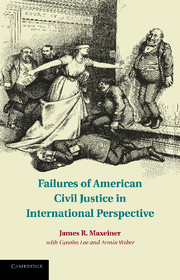Book contents
7 - Judgments, Appeals, and Outcomes
Published online by Cambridge University Press: 07 September 2011
Summary
Mary Roh has reached the end of the process. She and John Doh Jr. are in the courtroom for the last session. They hope that this will be their last day in court together. They can and should expect a decision that day. The case was not difficult. The judge has no special ground to delay decision; a jury, if there is one, should not take much time to decide their case.
If it is in the United States and if there is a jury, Roh and Doh will fidget as the judge instructs jurors in their duties. The jurors will retire; Roh and Doh will perspire. They will pace about the courthouse until the jurors return. That is not likely to be in much less than an hour. Even jurors who have made up their minds before leaving the courtroom do not want to return too soon. They want to show that they have deliberated carefully. Because there is no way to demonstrate that in writing, they allow time for deliberation to suggest it.
If it is in Germany or Korea, the judge should announce the decision from the bench that day. German and Korean judges may have ready a draft of the reasons that they will give; if they do, they may read from it. If they are not ready with written reasons, they are required to summarize the basis for their decisions orally and provide written reasons later.
- Type
- Chapter
- Information
- Failures of American Civil Justice in International Perspective , pp. 200 - 248Publisher: Cambridge University PressPrint publication year: 2011

